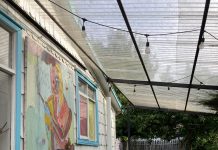Andrew Hernandez
Investigative Beat Reporter
Faculty, staff, and students of UC Santa Barbara (UCSB) marched from Storke Tower Thursday afternoon, marking the first official day of a full strike on campus joining and standing in solidarity with the Cost-of-Living Adjustment (COLA) movement.
UCSB is the second UC campus, following UC Santa Cruz (UCSC), where graduate students are holding wildcat strikes to demand a COLA, citing rent burden within the Santa Barbara area.
According to the COLA4UCSB demand letter, the adjustments UCSB graduate students are asking administration for amount to an extra $1,807.51 per month. For comparison, UCSC graduate students demand a monthly stipend of an extra $1,412.
Though primarily concerning the hundreds of teaching graduate students on campus, a significant amount of faculty came out in support of the cause both in person and through a petition. 85 UCSB faculty members demonstrated and an unspecified number have signed a non-cooperation pledge in support of striking Gauchos.
Dr. Ralph Armbruster-Sandoval, executive board member of the UCSB Faculty Association (SBFA), was admittedly a bit anxious before the march. In an interview with The Bottom Line (TBL), Armbruster-Sandoval said a number of faculty formed a steering committee early last week that wanted to take its cues from students in an effort to “exercise any sort of power or authority on campus they had.” He acknowledged they could only apply as much pressure as they could, but hoped that by making themselves visible in the protest they could make a statement.
A delegation of faculty was sent to administrators in Cheadle Hall to make their case in support of their graduate students before joining the march at high noon. Miya Barnett, an assistant professor of clinical psychology in the department of counseling, clinical, and school psychology at UCSB, said that she respects the work of the teaching assistants (T.A.s) and that it’s necessary that their cost-of-living adjustment needs are met.
Christine Weidner, a member of the COLA Faculty Outreach Committee, is in charge of educating and explaining why COLA is an important cause for faculty to join, as the movement aims for a COLA for all rent-burdened populations on campus.
Weidner, who is also a Ph.D candidate for the English department, illustrated the graduate struggle to TBL by comparing how much further her current salary would get her in her hometown of Johnstown, Pennsylvania than it does in Santa Barbara. “I have worked every year two to three jobs on top of that, to make ends meet here. Thankfully faculty are quite supportive. If graduate students are taking on multiple jobs to make ends meet, we are not able to be the best we can for our faculty,” she said.
Professor Ben Olguin of the English department and professor Constance Penley of film and media studies offered advice from their past experiences in helping the organization of UCSB’s COLA strike, which Weidner described as “exceptional.”
Despite the amount of support, there has been hesitancy from some faculty members. The lack of information because of the lack of a centralized channel of communication between faculty is what COLA supporters highlight as the impediment to gaining even more of their support.
Armbruster-Sandoval said, “If we were unionized, we would have like an infrastructure on the ground, with fact sheets, this, that and a whole bunch of information. When a labor action like this, then we’d be ready to swing into action.” Almost none of the faculty are completely unsympathetic to the cause of the graduate students; they just want to take the course of action that is right for all.
UCSB Chancellor Henry T. Yang issued a statement Thursday: “Our graduate students are an integral part of our UC Santa Barbara community, and their contributions are indispensable to fulfilling our mission of teaching, research, and service,” adding later on, “We met with our graduate students earlier this week, and have been listening to our graduate and undergraduate students as well as faculty and staff to better understand the living and learning environment. We are committed to working collaboratively to find solutions that address the concerns of all of our graduate and undergraduate students.”
After 54 to 80 grad students at UCSC last Friday who withheld grades last fall were fired, according to payusmoreucsc.com, the COLA movement up north and on campus show no sign of stopping anytime soon. Almost no one has expected COLA’s scale and spread and the speed at which it dominated the discourse across campuses statewide. UCSB’s protest on Thursday was a sign of collective people power that Armbruster-Sandoval summarized as “pretty badass.”









So are there no classes next quarter being taught by teaching assistants? Where does that leave students?
Comments are closed.